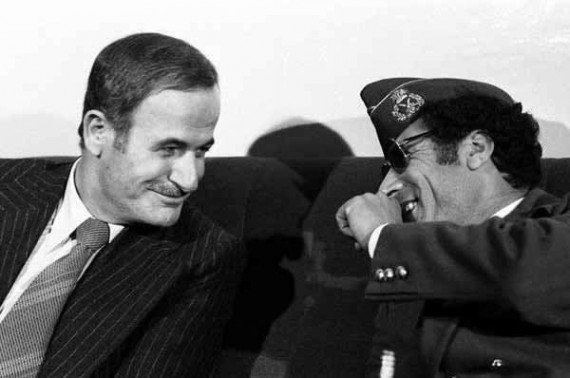Western Opportunism
For the past 8 years, Muammar Qaddafi thought himself successfully rehabilitated. He had reset his relationships with the West, leaving him comfortably without enemies and invulnerable to West-approved regime change. Though his Libyan regime had comfortably played the role of international pariah for decades, in 2003 Qaddafi began to rethink the most anti-Western of his policies, a result, most assume, of Saddam Hussein, his former ally in infamy, being dragged out of a foxhole and thrown into an Iraqi prison cell. This is not to suggest that he let go of his trademark vitriolic rhetoric, indeed this has remained Qaddafi’s hallmark modus operandi since his coup 42 years ago. But behind his occasional threats of jihad against Switzerland and his assertion that swine flu was a Western chemical weapon gone wrong, Qaddafi was a much more willing partner with the West.
On December 19, 2003, nine months exactly since the commencement of Operation Iraqi Freedom, Qaddafi announced Libya’s unilateral decision to abandon its development of weapons of mass destruction. Then-British Prime Minister Tony Blair called Qaddafi’s promise “courageous”. Beyond the plaudits, Libya’s global prospects soared. As a result of Libya’s removal from the U.S. State Department’s list of State Sponsors of Terror, Libya’s foreign direct investment ballooned from a paltry $143 million in 2003 to $4.69 billion in 2007, an increase of 3179%. Qaddafi became the president of the African Union and he posed for photos with Western heads of state, formerly bitter enemies. Italy, home to the oil company ENI which had a 50% share in two of Libya’s biggest oil fields, even went so far as to sign a “Treaty of Friendship” with Qaddafi.
Despite the rapprochement, it took relatively little time for the West to abandon Qaddafi following the outbreak of the Libyan civil war. The Libyan conflict is the only one of the Arab Spring to have involved NATO forces. The operation in Libya was organized under the banner of humanitarianism. Indeed, the fact that Qaddafi had threatened to kill the rebels like “rats” and “dogs” suggested that Western action was necessary to prevent a possible genocide. None of this seems objectionable. Rather, it is the West’s choice to intervene in Libya instead of any of the other Arab countries facing tumult that raises eyebrows.
In Syria, the government of Bashar al-Assad has been slaying its political opponents by the score for months. The United Nations puts the total number of dead at over 2600, with that figure climbing every day. The Assads, like Qaddafi, have been known to massacre their own citizens with impunity, with the best evidence being Bashar’s father Hafez al-Assad’s 1980 assault on the city of Hama that killed between 10,000 and 20,000. Syria funnels weapons and money to Hamas and Hezbollah, both labeled terrorist groups by the U.S. and European Union. Syria is also Iran’s closest ally in the region, and both are sworn enemies of the West.

And yet, NATO used its increasingly limited appetite for combat to intervene in Libya. With few financial resources to expend and little public support for new international entanglements, the West, led by the United States, had to choose from the menu of intervention opportunities offered by the Arab Spring. It could not sit out altogether for fear of losing influence in a reshaped Arab world.
A brief comparison of Syrian and Libyan conflicts points to the reasoning behind NATO’s ultimate intervention choice. Libya’s population is 6.6 million, with most of it in cities on the Mediterranean. The plan was for a maritime blockade along with air support that would cripple Qaddafi’s regime, which ultimately proved effective. Libya’s neighbors were also not particularly worrisome. Egypt and Tunia had just undergone their own revolutions and would be supportive of the Libyan rebel cause. Algeria desperately wanted to avoid all contact with the Arab Spring, fearing that it was a dangerous threat to its dictatorship. Crucially, the rebels were organized enough to have a credible political organization that could be responsible for the transition from despotism to democracy. The battle for Libya would be quick, cheap, and morally justifiable.

Syria, on the other hand, was an entirely different quandary. The Obama administration reinstated an ambassador to Syria in 2009 to pursue negotiations and improved relations with the Assad regime. Secretary of State Hillary Clinton praised Assad as a “reformer”. Syria is still technically at war with Israel, a conflict the West fears could flare up at any time. Also, any conflict with NATO in Syria could potentially pull in Iran, a doomsday scenario that would likely cause the entire Middle East to plummet into war. And yet, the humanitarian reasons for intervening in Syria are just as legitimate as those in Libya.
The decision to intervene in Libya is now long in the past with its results showing a tentative victory for the NATO-supported rebel cause. Barack Obama, David Cameron, Nicolas Sarkozy, and others can chalk up a politically helpful foreign policy victory. But if the mantra of NATO and the UN resolution that authorized its use of force is the “responsibility to protect,” then has the West not failed in Syria? It’s difficult to claim a moral victory while innocent blood still flows in the streets of Hama.